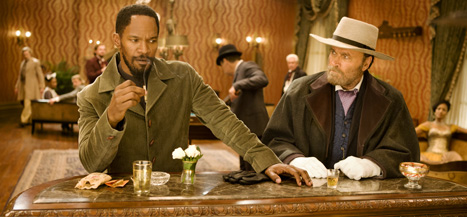Movie Review: Django Unchained
By Matthew Huntley
December 25, 2012
BoxOfficeProphets.com

Nowadays, long after Tarantino first established himself as a major player with Pulp Fiction, his movies have a greater probability of being a double-edged sword. On the one hand, they’re exciting and entertaining, funny and dramatic, all at once. On the other, since we now know what to expect from the distinct writer-director, they’re genre films themselves because they abide by Tarantino’s own formula, a formula that’s not as unique as it once was. We’ve seen enough of his movies to know when his own conventions are at work, and while they’re still a showcase for juicy performances, over-the-top violence and eccentric, random dialogue, they’re not as fresh as they used to be. In a way, Tarantino has become a victim of his own creativity.
That’s more or less how I saw Django Unchained, which is a good film but not an indelible one. It lacks that original Tarantino spark, probably because he’s chosen to do with Spaghetti Westerns what he’s already done with other genres, which is to blend and pay homage to them. But because we’ve seen him do this before, his style and approach are no longer as impactful. Granted, this is more an observation than a flaw, and Tarantino remains one of our best living filmmakers, but it wouldn’t hurt if he opted to re-invent himself and move beyond his usual “Tarantino” thing.
The film takes place during the Civil War in the American South and opens on a cold, dark night in the woods. A polite and well-spoken German man named Dr. King Shultz (Christoph Waltz) approaches two white men leading a chain gang of slaves. Shultz is driving a stagecoach with a giant tooth on top. He used to be a dentist but now this is just a front for his real profession: bounty hunter. And if you don’t believe him, just ask him for his papers and he’ll prove it to you. And if you rub him the wrong way, he’ll also prove himself the expert marksman.
What’s Shultz’s business with these slaves? He wants to free the one called Django (Jamie Foxx) because he’s the only one who knows what the Brittle Brothers look like. As he later explains, Big John, Roger and Ellis Brittle have a high price on their heads - dead or alive - and he wants to round them up and collect the bounty.
Shultz makes a deal with Django: in exchange for helping him find and identify the Brittle Brothers, he’ll help Django rescue his wife, Broomhilda (Kerry Washington), who was sold to a different plantation owner. They wait out the winter as Shultz clothes, feeds and trains Django in the art of gun slinging, making him a small partner in his bounty hunting business. The two develop an unspoken friendship and loyalty to each another, so much that when they eventually discover Broomhilda belongs to the egotistical Calvin Candie (Leonardo DiCaprio), a man who likes nothing more than the sound of his own voice, Shultz himself feels like has a personal stake in the matter.
To infiltrate Candie’s plantation and carry out their rescue mission, Shultz and Django pretend they’re in the slave fighting business - in which two black men wrestle, bite and break each other to death - and plan a rouse to buy Candie’s fighters while subtly persuading him to throw in Broomhilda. Whether or not they succeed is up for you to find out, but their plan gets more difficult when Candie’s butler, Stephen (Samuel L. Jackson), grows increasingly suspicious of Shultz and Django’s intentions. He sees the way Django looks at Broomhilda and, to him, something doesn’t smell right.
Expectedly, Django Unchained contains all the usual Tarantino characteristics: ultra-bloody and in-your-face violence and gore; nudity; liberal usage of the “n” word; anachronistic music on the soundtrack; long passages of observant dialogue that’s not necessarily functional to the plot but used instead as character development; quick zoom-ins; references to other movies; and a cameo by Tarantino himself. The movie is his way of honoring the quintessential Spaghetti Westerns pioneered by Sergio Leone and Sergio Corbucci in the 1960s, which distinguished themselves from standard American Westerns by incorporating anti-hero protagonists, excessive violence, and a debunking of traditional, romantic Western values. Spaghetti Westerns were low budget and sought to expose the West for what it was really like and thus shatter Hollywood’s glorification of it.
Tarantino wants to do that, too, and the world he creates in Django Unchained is not an attractive one. It’s full of cynicism, racism, extreme violence and reprehensible people. But ironically, and in true Tarantino fashion, it has a backdrop of humor and characters with modern-day sensibilities. There’s a particularly funny moment when a plantation owner played by Don Johnson and his posse ride around with white sheets on their heads with the intent to kill Shultz and Django. Tarantino illustrates their frivolity by pausing for the men to complain they can’t see out of their sheets because the holes are too small.
As with most of Tarantino’s films, Django Unchained is not about its story as much as it is its style. It’s meant to be fun, humorous and self-aware, though it’s also interspersed with some effectively serious moments. While it works on these levels, it had me recalling Tarantino’s other, better works like Pulp Fiction and Jackie Brown, which suggests Django Unchained doesn’t quite have the ingenuity or originality to make a classic Tarantino picture. I recommend it because it’s well written and acted, and there are plenty of exciting payoffs - character, action and other - but because Tarantino has such a rich body of work, it’s hard not to hold him to a higher standard and always expect great things. Django isn’t great, but it is good, and I suppose on a Tarantino scale, “good” is still a worthy accomplishment.